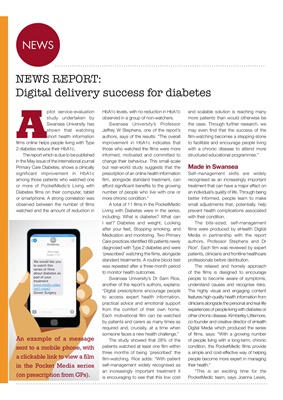
NEWS
A
pilot service-evaluation
study undertaken by
Swansea University has
shown that watching
short health information
films online helps people living with Type
2 diabetes reduce their HbA1c.
The report which is due to be published
in the May issue of the international journal
Primary Care Diabetes, shows a clinically
significant improvement in HbA1c
among those patients who watched one
or more of PocketMedic's Living with
Diabetes films on their computer, tablet
or smartphone. A strong correlation was
observed between the number of films
watched and the amount of reduction in
HbA1c levels, with no reduction in HbA1c
observed in a group of non-watchers.
Swansea University's Professor
Jeffrey W Stephens, one of the report's
authors, says of the results: "The overall
improvement in HbA1c indicates that
those who watched the films were more
informed, motivated and committed to
change their behaviour. This small-scale
but real-world study suggests that the
prescription of an online health information
film, alongside standard treatment, can
afford significant benefits to the growing
number of people who live with one or
more chronic condition."
A total of 11 films in the PocketMedic
Living with Diabetes were in the series,
including: What is diabetes? What can
I eat? Diabetes and weight, Looking
after your feet, Stopping smoking, and
Medication and monitoring. Two Primary
Care practices identified 68 patients newly
diagnosed with Type 2 diabetes and were
'prescribed' watching the films, alongside
standard treatments. A routine blood test
was repeated after a three-month period
to monitor health outcomes.
Swansea University's Dr Sam Rice,
another of the report's authors, explains:
"Digital prescriptions encourage people
to access expert health information,
practical advice and emotional support
from the comfort of their own home.
Each motivational film can be watched
by patients and carers as many times as
required and, crucially, at a time when
someone faces a new health challenge."
The study showed that 28% of the
patients watched at least one film within
three months of being 'prescribed' the
film-watching. Rice adds: "With patient
self-management widely recognised as
an increasingly important treatment it
is encouraging to see that this low cost
NEWS REPORT:
Digital delivery success for diabetes
and scalable solution is reaching many
more patients than would otherwise be
the case. Through further research, we
may even find that the success of the
film-watching becomes a stepping-stone
to facilitate and encourage people living
with a chronic disease to attend more
structured educational programmes."
Made in Swansea
Self-management skills are widely
recognised as an increasingly important
treatment that can have a major effect on
an individual's quality of life. Through being
better informed, people learn to make
small adjustments that, potentially, help
prevent health complications associated
with their condition.
The bite-sized, self-management
films were produced by eHealth Digital
Media in partnership with the report
authors, Professor Stephens and Dr
Rice*. Each film was reviewed by expert
patients, clinicians and frontline healthcare
professionals before distribution.
The relaxed and homely approach
of the films is designed to encourage
people to become aware of symptoms,
understand causes and recognise risks.
The highly visual and engaging content
features high-quality health information from
clinicians alongside the personal and real-life
experiences of people living with diabetes or
other chronic disease. Kimberley Littlemore,
co-founder and creative director of eHealth
Digital Media which produced the series
of films, says: "With a growing number
of people living with a long-term, chronic
condition, the PocketMedic films provide
a simple and cost-effective way of helping
people become more expert in managing
their health."
"This is an exciting time for the
PocketMedic team, says Joanna Lewis,
An example of a message
sent to a mobile, with a
clickable link to view a film
in the Pocket Media series on
prescription from GPs.